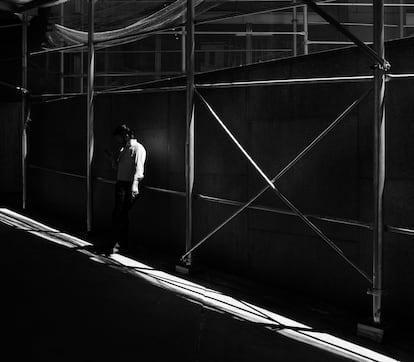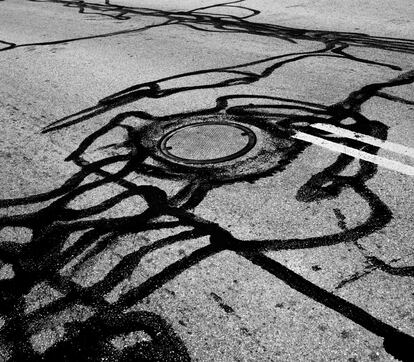A Spaniard in New York: David Jiménez’s photographs evoke Bob Colacello’s city
In ‘New York Memories,’ the American writer reflects on the city through his recollections, accompanied by the Spanish photographer’s images

When the first version of artist and writer Joe Brainard’s I Remember hit New York bookstores in 1970, it quickly sold out. The singular publication was not exactly a memoir or a book of aphorisms but rather a series of disordered memories, of lost thoughts charged with great poetic magnetism, each of which began with “I remember.” Paul Auster described it as a masterpiece: “With simple, forceful sentences, it maps the human soul and permanently alters the way we look at the world.” Over the years, that repetitive formula has inspired different publications (Georges Perec’s I Remember and Marcello Mastroianni’s I Remember are among the most outstanding ones). The most recent addition is New York Memories (Ivorypress), a collaboration between the writer Bob Colacello, and Spanish photographer David Jiménez.










At the age of 23, native New Yorker Colacello was already a privileged observer, and participant, in New York’s vibrant creative and social scene from the vantage point of Interview (the magazine founded by Andy Warhol, which the writer edited for thirteen years). Among that motley circle, Brainard’s publication was striking for its freshness and forthrightness, achieved through a mixture of triviality and frank revelations, the minor thrills that “serious” authors often eschew. “It was funny, intelligent [and] light, but it had a lot of substance between the lines,” Colacello, now 76, says during our telephone conversation. “But it was also a furious publication. The most furious works can be the funniest, and vice versa. Seriousness alone is boring and difficult to navigate. As F. Scott Fitzgerald said, the true sign of intelligence is the ability to entertain two contradictory ideas at the same time.” In a way, New York Memories demonstrates that with its juxtaposition of the writing of the native Colacello —pleasant, concise and full of anecdotes— with the often more aseptic vision of the Spaniard, Jimenez, who employs a more enigmatic and silent approach, expressed in black and white images. Without losing sight of the essential, the sharp contrast sometimes becomes more abstract and gives rise to dramatization and lack of definition.
“It is the piece that was easiest for me to write,” the author says. “Not so much because of its brevity, but because once I decided to make a kind of homage/parody of I Remember, everything fell into place. I could have written a thousand more I forgets,” he adds, referring to his decision to replace “I remember” with the much less melancholy “I forgot.” Perhaps he remembers that he had forgotten what Fereydoon Hoveyda, Iran’s former representative to the United Nations, told him: “Nostalgia is a sign that a society fears the future.” Even so, throughout its chronological approach, moving from the author’s childhood in the suburbs of the city to the present day, the book exudes a longing for the past. “I believe in the nostalgia of maturity,” the writer concedes. “It’s important to have a sense of history, to learn from it. History is full of great characters, great leaders, civilizations that rise and then fall, incredible stories. However, I believe that the problem today is not so much an excess of nostalgia, but the tendency to look at history through the ideology of the present,” he emphasizes. “In terms of nostalgia, yes, of course I miss Studio 54, although if I could go back, I certainly wouldn’t. The only thing I really miss is my typewriter. I wish I were brave enough to throw my computer into the Atlantic Ocean,” the author says.

History also plays an important role in Jiménez’s work. The author of Infinito [Infinite] —considered a pioneering Spanish photobook— explains that “all of a sudden,” New York—the city on which the author has focused his work in recent years—strikes him “as a new Rome. While Rome is shown as an amalgam of layers of Western history, perhaps New York contains the greatest diversity of elements of our time, a whole amalgam of people and typologies, of social and economic strata, layers that overlap in a smaller and more contemporary space of time.”
“It was a challenge to look for new aspects, the unsuspected, in the city’s most iconic places,” David Jiménez admits.
New York Memories is a book that seduces as much for its simplicity and elegance as for the substance of its pages. Its small format is conducive to generating the degree of intimacy that each memory entails, and its verticality contributes to conveying the different sensations of passersby as they wander among the city’s skyscrapers, through timeless images. “It was a challenge to look for new aspects, the unsuspected, in the city’s most iconic places,” the photographer admits.
“I forgot that Truman Capote told me, ‘Don’t listen to Andy. He doesn’t know the important thing about love!” writes Colacello. In a narrative created through memories, the recollections transcend the author and, similar to Brainard’s book, become collective memory, where everything has a place—glamour, feminism, crime and the ups and downs of the artistic world. It is a portrait of a city that is always reinventing itself. But it is also the story of a moment and, especially, a spirit, in which the coexistence of the underground and celebrity culture gave rise to a fruitful encounter. “When the Vietnam War ended, my generation left protests behind and started dancing to the disco music coming from black clubs. Then we went to the gay clubs. Later, we all started dancing together. No barriers, no labels,” the writer recalls.
“Another factor that has made the situation worse, and not just in New York, is the political correctness that surrounds us, as well as cancelation culture,” laments Bob Colacello
“AIDS and 9/11 changed everything. Since then, it hasn’t been possible to be as frivolous or decadent as in previous decades. But another factor that has made the situation worse, and not just in New York, is the political correctness that surrounds us, as well as cancelation culture. Today, people are much more afraid: afraid every time one goes to the airport, and they practically strip one naked, afraid of having to measure every word one uses in a public debate. Fear does not lend itself to joie de vivre. Still, young people keep coming to the city, and, although life is much harder and more expensive, there is a lot of creative energy. New things are always happening. However, I don’t know if it will ever be possible to reach that place of near ecstasy that was achieved in the late 1970s and early 1980s.

“I forgot that Diana told me that my job as the editor of Interview was not to give people what they want, but to give them what they don’t know they want yet,” Colacello writes. The advice of legendary editor Diana Vreeland reverberates in the reader’s head, sadly familiar with the precepts of the current vacuous, predictable, tyrannical age of likes on social media. “I’m sorry to say that it’s the masses who rule, not the elites,” the writer observes. “Vreeland was there to open people’s eyes. She familiarized middle-class readers in a very provincial America with what was happening elsewhere. She improved their lives instead of boring them with the same old formulas. When Andy hired me as editor, I had no experience. We didn’t know where we were going. So, we did something different, something new.”
More than a memoir, New York Memories opens a door to the city. “I forgot that no matter what happens, New York moves on [with its] feet on the ground, head held high, with an open heart and mind.”
New York Memories. Bob Colacello and David Jimenez. Ivorypress, 2023. 120 pages. €32.25.
You can follow BABELIA on Facebook and X, or sign up here to receive our weekly newsletter.
Tu suscripción se está usando en otro dispositivo
¿Quieres añadir otro usuario a tu suscripción?
Si continúas leyendo en este dispositivo, no se podrá leer en el otro.
FlechaTu suscripción se está usando en otro dispositivo y solo puedes acceder a EL PAÍS desde un dispositivo a la vez.
Si quieres compartir tu cuenta, cambia tu suscripción a la modalidad Premium, así podrás añadir otro usuario. Cada uno accederá con su propia cuenta de email, lo que os permitirá personalizar vuestra experiencia en EL PAÍS.
¿Tienes una suscripción de empresa? Accede aquí para contratar más cuentas.
En el caso de no saber quién está usando tu cuenta, te recomendamos cambiar tu contraseña aquí.
Si decides continuar compartiendo tu cuenta, este mensaje se mostrará en tu dispositivo y en el de la otra persona que está usando tu cuenta de forma indefinida, afectando a tu experiencia de lectura. Puedes consultar aquí los términos y condiciones de la suscripción digital.









































